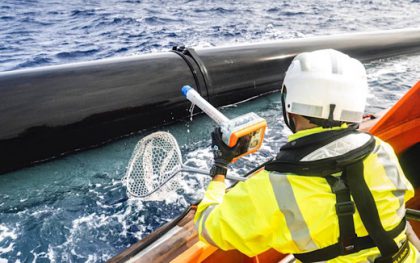 One of the main concerns and aims of our Channel is to look after any event, news, article and anything that can help for the great problem of plastics wastes and specially “marine litters”. In this regard, we may publish our own news or from any other sources, keeping in our mind their copy rights which due to the sanctions and non-approval of international payments for copy rights in Iran, we normally seek permission from the sources, if they answer.
One of the main concerns and aims of our Channel is to look after any event, news, article and anything that can help for the great problem of plastics wastes and specially “marine litters”. In this regard, we may publish our own news or from any other sources, keeping in our mind their copy rights which due to the sanctions and non-approval of international payments for copy rights in Iran, we normally seek permission from the sources, if they answer.
Marine plastics pollution is a global problem, so will it require a stronger global solution like some sort of tax on plastics to pay to clean up waste in developing countries?
That provocative idea was on the table at a high-level United Nations meeting on plastic marine litter and microplastic pollution Dec. 3-7 in Geneva.
The main purpose of the gathering was to examine whether the world needs a new global treaty for managing plastic waste, a sort of Paris Climate Agreement or Montreal Protocol for polymers that could put binding requirements on countries.
The group’s recommendations will feed directly into the next meeting of the United Nations Environment Assembly, slated for March in Kenya.
Most of the push for global funding seemed to come from environmental groups like the World Wildlife Fund. But governments from Norway to Indonesia, while deferring on thorny questions of how to finance, were pushing for stronger action from governments.
The plastics division of the American Chemistry Council had a representative to the five days of discussions and its senior executive said that even though different viewpoints were aired, there was broad agreement new approaches were needed, even if it was hard to agree on what that would be.
“We have reached an inflection point where there is rapidly growing awareness and commitment to action on the need to prioritize waste management around the world, in particular in emerging economies,” said Steve Russell, vice president of the plastics division for the American Chemistry Council.
“I think there’s also growing recognition that ‘business-as-usual’ is unlikely to be our way forward, whether it’s disruptive technology or financing mechanisms or advances in different systems to create value from waste,” Russell said. “There is now collective resolve.”
In a report prepared for the meeting, the World Wildlife Fund called for fees on plastic products and new, legally binding treaties.
“The plastic production industry makes annual revenues of $700 billion, and one option could be to introduce levies on plastic products,” the WWF report said. “This would create a win-win situation as such a levy could be designed to reduce unnecessary consumption, stimulate use of recycled content and recollection, in addition to generate the necessary funds to feed a trust fund and to invest into waste management systems.”
At the last U.N. Environment Assembly in late 2017, Norway said it wanted to explore binding legal treaties, and it said current global rules have too many gaps for regulating plastic, allowing too much debris to slip into the oceans.
Please read more from the “SOURCE“











